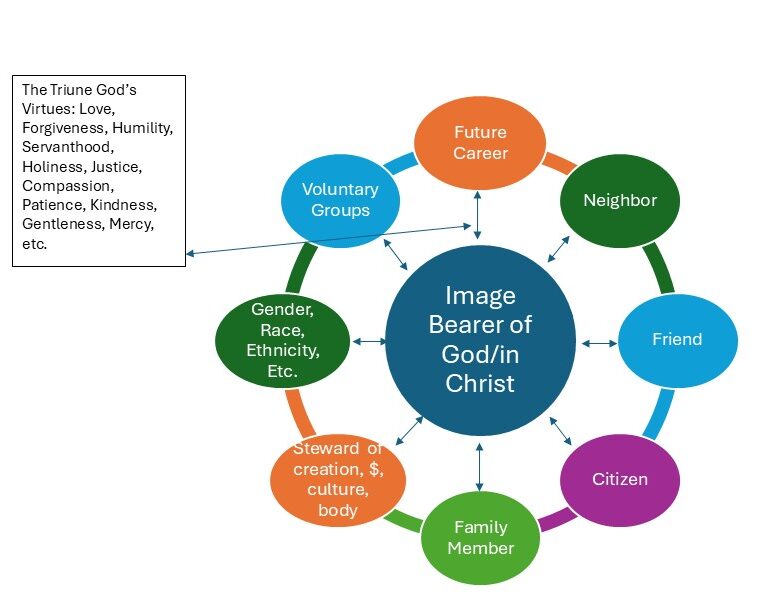Today’s guest post is from Dr. Perry Glanzer, Professor of Educational Foundations at Baylor University.
Growing numbers of young people today lack a sense of purpose. The Wall Street Journal reported that the highest-ever percentage of U.S. 12th graders “wonder if there is a purpose to life given [the] world situation.” That’s over 30%.
My research on college students and life purpose backs up such findings. College students today, including many Christians, struggle to find purpose. The purposes they do prioritize are often self-focused ones emphasizing happiness, new experiences, and/or a career.
Even Christian students often miss important theological truths that could help them craft a fully biblical sense of purpose. Here I want propose a theological concept of purpose that addresses the major weaknesses I see in Christian students’ thinking. I hope this model might help Christian professors, campus ministers, and pastors offer young adults a more robust vision for purpose.
As one might expect, nones, agnostics, and atheists have a lower sense of purpose than religious adherents. For example, a 2019 survey found only 29% of atheists and agnostics agreed with the statement, “I feel like I have purpose in my life; my life has meaning.”
As my book The Quest for Purpose showed, many Christians are able differentiate between one’s larger life purpose and one’s specific career calling. Brandi’s response (all names are pseudonyms) illustrates this two-level thinking: “I would say in terms of my education I’m still trying to find a purpose. But I believe I have a purpose in my life separate from my education…: my purpose is to live a life that reflects my faith in Jesus Christ.” In this respect, Christianity allows students to have a clear overall life purpose even when aspects of their life, such as one’s major or career, are undecided.
In my research team’s interviews with Christian college students about life purpose, however, we find Christians tend to use four kinds of theological language that create some challenges. The first three kinds of language are used to describe their broad purpose. The last terms are almost always associated with their anticipated major or career.
1. Glorify God Language
Echoing the Westminster Confession, the most common language we hear from Christian students when they describe their purpose is something like “glorify God with everything I do and say.” Holly provided this version of it: “I think while my purpose in life would be to worship God probably and yeah, I mean, that’s the main purpose.” While this is a historically valid answer, it is often interpreted narrowly, or its implications are ambiguous (as reflected in Holly’s answer). We asked Taylor, “Any inkling yet in terms of how you think that might play out in your life? He replied, “I don’t know exactly what it will look like, but definitely following what I feel called to which is to go to college and I want to go to grad school and do research and eventually get married and I feel like that’s all part of my purpose in glorifying God through those things and what I feel passionate about.” In Taylor’s case, glorifying God is combined with one’s passions and desires in chosen areas of life.
2. To Know God and Make Him Known, Make Disciples
Another group of students employ Great Commission language. For example, Katy noted, “My church from home, they had this slogan that they had is ‘to know God and make him known’. So that being the purpose of my life.” Milo shared that his purpose was to “make disciples.” Certainly, this Christ-given purpose is biblical. Yet, students have a narrow understanding of what this task entails. For them, it primarily involves evangelism. Thus, it elevates missionaries and pastors to the most noble professions. This view would implicitly consider “secular” professions, at best, as providing funding for “making God known.”
3. Imitate Christ
The third common way of articulating one’s Christian purpose is imitating Christ. Holly noted, “I would 100% say my life purpose is just to live life like Jesus.” Bea expanded the context: “I think as a Christian your main purpose is to emulate Jesus’ teachings in every way that you can, including your future workspace and basic relationships that you have.” Again, this articulation is clearly biblical, although it could imply that imitating Christ is something we add to our lives, instead of something we were originally designed in creation to do.
4. Vocation or Calling Language
Fourth, many students use vocation or calling language. PJ told us, “I don’t feel like I have that specific of a vocation or calling yet. But I would say my general purpose is to serve God with the gifts that He’s given me.” This language is often reinforced on Christian campuses where students may visit a “Calling and Career Center.” One limit with this language, however, is that it reduces calling and vocation simply to one’s career and not to other areas of life. As a result, it misses other key human endeavors (e.g., marriage, parenting, friendship, stewardship, church membership, etc.).
An Alternative Image
There is better theologically-informed language of how to describe their purpose: that of “image bearer.” For example, Grace said her Christian purpose had “given me a very clear, ‘This is what I’m meant to do,’ and that’s sort of the outline, and then I color in between the lines. I think someone who didn’t have that, it would be a lot more confusing and intimidating to try to come up with the whole image and the colors in between.” The key word here is “image.”
However, I have not met one college student who explicitly connected their purpose to bearing God’s image (Gen. 1:27). If they did, it would help them recognize some things that the other expressions do not provide. First, if we recognize that we are made in God’s image, we realize that we do not gain our worth and value by doing something (e.g., making God known, imitating Christ, fulfilling a particular vocation). We have value and worth simply in the reality that God made us, and (for Christian believers) has redeemed us.
Bearing God’s image is the first vocation expected of all humans. Indeed, as N.T. Wright notes, “the whole New Testament insists that the point of Christian living is the remaking of humans in God’s image.” This remaking involves two things illustrated in the figure below. Just as God is known through multiple roles (e.g., teacher, Lord, Father, etc.), we also exhibit what it means to be human in multiple identities.
I prefer to use the word identity versus vocation or calling because we do not choose some of these identities. I am a son, neighbor, and citizen whether I choose to be or not. Thus, the real question is whether I will be a God-glorifying one. By starting with creation, we help students recognize that in terms of purpose, pastors and missionaries are not on a higher plane than engineers who create (an important expression of God’s image), or accountants who help us steward (an important Genesis 1 commission), etc.
Finally, we become excellent in these identities both by learning from creation what it means to be excellent (e.g., an excellent friend, daughter, grandfather) but also by applying the triune God’s virtues to our pursuits.
When the New Testament refers to being like Jesus, it is specifically regarding the virtues he exhibits (Luke 6:36; John 13:14; Eph. 5:1–2; Phil. 2:1-11; Col. 3:13; Heb. 12:1-3; I Pet. 1:15–16; I Pet. 3:17-18). We must learn what it means to be a loving professional, a faithful church member, a forgiving neighbor, a humble friend, a just citizen, a generous steward of money, a gentle parent, and more. That cannot happen in the abstract. We must acquire and practice virtue in each context.
So, what do I think would be a helpful purpose statement for Christians? To glorify and enjoy God by bearing God’s image.
Book links are part of the Amazon Associates program.

















